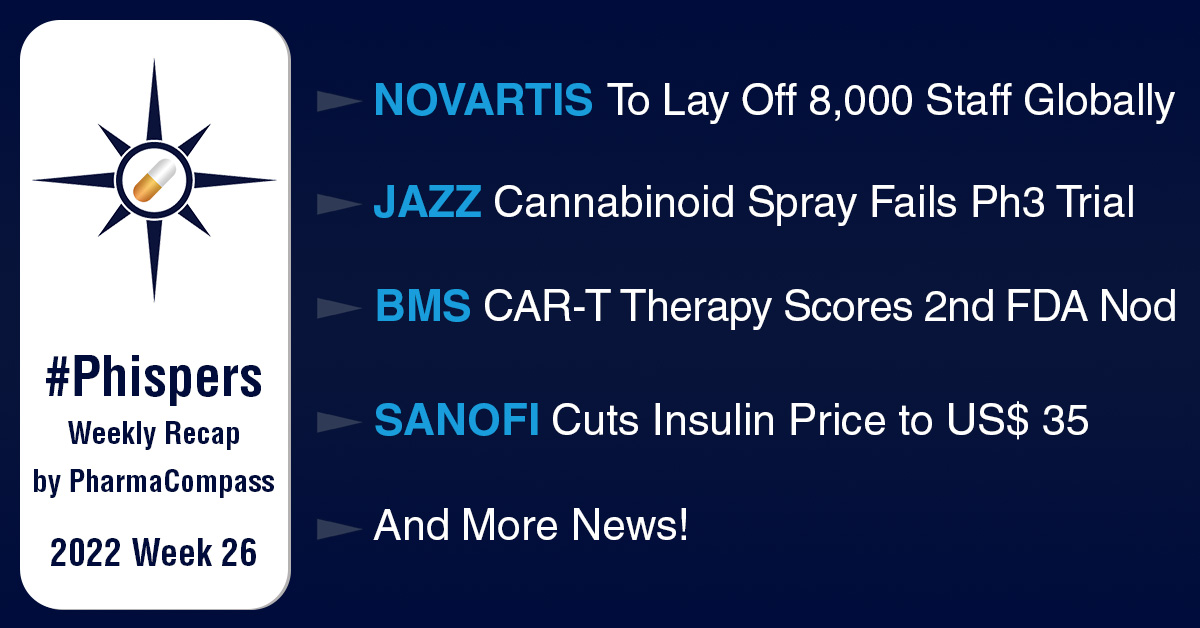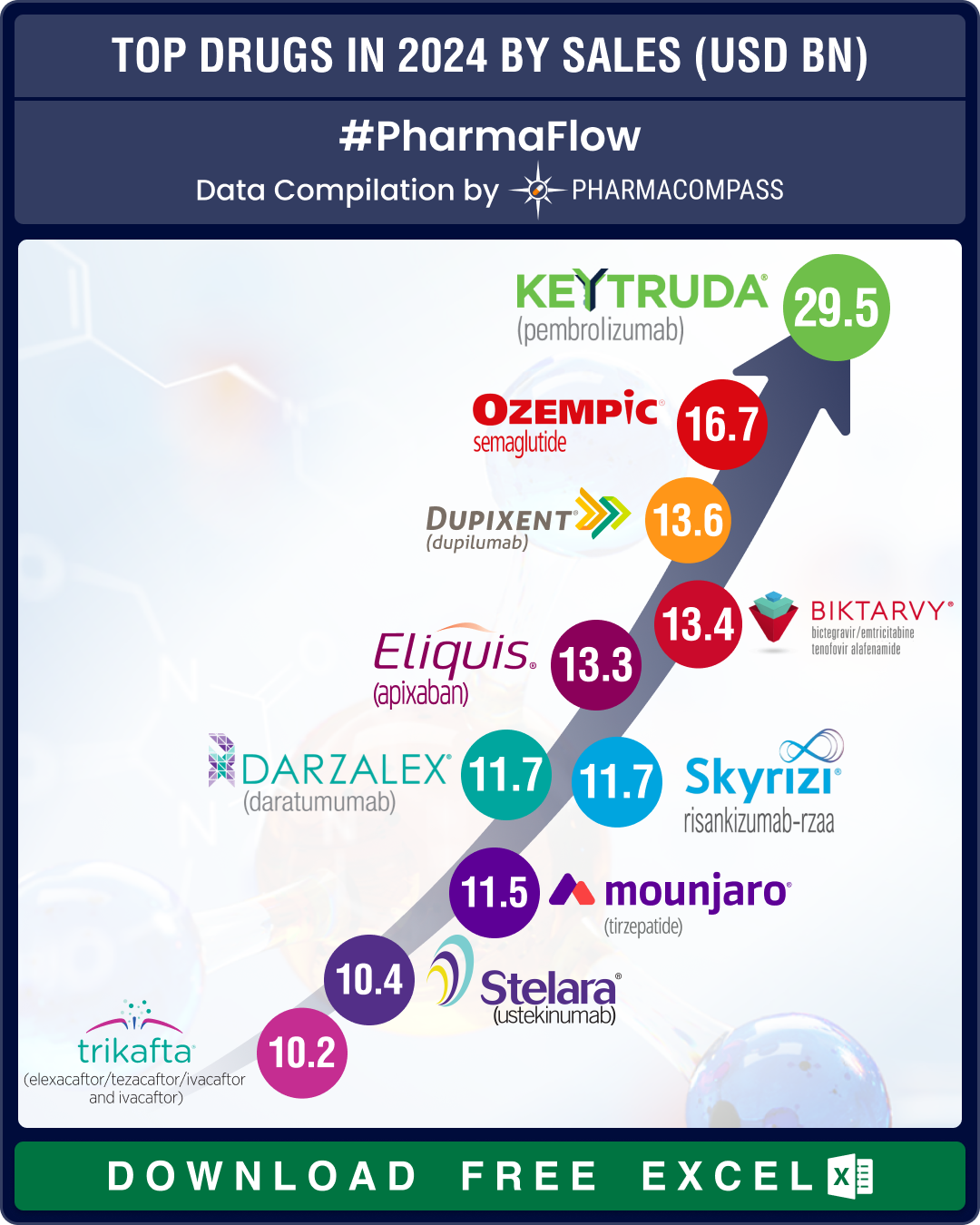
By PharmaCompass
2022-06-30
Impressions: 1,845
In this week’s news, Novartis announced it may cut as many as 8,000 jobs, or about 7.4 percent of its global workforce, in a bid to make the organization “leaner and simpler” and save around US$ 1 billion in costs. The drugmaker’s Tafinlar-Mekinist drug combination has received an accelerated approval from the US Food and Drug Administration (FDA) to treat any metastatic solid tumor with a mutation known as BRAF V600.
This week’s Phispers also has news on Sanofi putting a cap on out-of-pocket insulin price in the US — at US$ 35 for 30-day supply — ahead of an impending ruling that is awaiting approval by the Senate. The earlier out-of-pocket cost was US$ 99. Its experimental Covid-19 vaccine, being developed along with GSK, delivered an efficacy rate of 72 percent against infections caused by the Omicron variant of SARS-CoV2.
In approvals, Bristol Myers Squibb’s CAR-T therapy Breyanzi has picked up a second approval in the US. It is now approved for treatment of adults with newly relapsed or refractory large B-cell lymphoma (LBCL), an aggressive form of blood cancer. The European Medicines Agency (EMA) has recommended a conditional authorization for BioMarin’s first-of-its-kind hemophilia gene therapy – Roctavian – to treat patients with severe hemophilia A who do not have factor VIII inhibitors.
Meanwhile, Jazz Pharmaceuticals’ cannabinoid treatment has failed a phase 3 trial. Over 21 days, the spray – known as Sativex – failed to improve lower-limb muscle tone as measured by the Modified Ashworth Scale (MAS) in patients with multiple sclerosis spasticity.
In regulatory news, the FDA has put clinical holds on Sarepta Therapeutics’ experimental Duchenne muscular dystrophy drug, SRP-5051, and a phase 1/2 study of Japanese pharma Astellas’ gene replacement therapy, AT845. Generics drugmaker Aurobindo Pharma has received a warning letter from Securities Exchange Board of India (SEBI) for disclosing “very limited and restricted information” about an FDA audit of its active pharmaceutical ingredients (API) manufacturing facility in Hyderabad. And four months after receiving a complete response letter (CRL), Gilead has moved the FDA a second time, seeking approval for its twice-a-year HIV drug, lenacapavir.
Novartis to lay off up to 8,000 globally in bid to save US$ 1 billion in costs
In April, Novartis had said it will cut thousands of jobs as part of its organizational makeover, merging its pharmaceuticals and oncology units into an innovative medicines (IM) unit. The Swiss pharma has now confirmed that it could cut as many as 8,000 of its 108,000 staff, or about 7.4 percent of its global workforce, in a bid to make the organization “leaner and simpler” and help it save around US$ 1 billion. Around 1,400 jobs will be cut in Switzerland.
The pharma said it “intends to eliminate roles across the organization.” The move “will allow us to reduce duplications of business structures in every country,” it added.
Novartis said it is also combining its technical operations and customer and technology solutions units into a singular “operations” unit.
While Novartis is looking to cut down staff, Fujifilm doesn’t plan to slow down on its expansion. Fujifilm is investing US$ 1.6 billion in order to expand the cell culture manufacturing services of its CDMO subsidiary – Fujifilm Diosynth Biotechnologies. The investment will create approximately 450 jobs at its CDMO sites in Denmark and Texas.
Its oral cancer drug combo wins tumor-agnostic approval: Already approved in the US for melanoma, lung and thyroid cancer, Novartis’ Tafinlar-Mekinist combination has clinched another nod from the US Food and Drug Administration (FDA). With the latest accelerated approval, the drug combo has widened its label to treat any tumor, regardless of its location, as long as it bears a specific biomarker. The pill combo generated US$ 1.7 billion in 2021 sales.
The approval covers adults and children as young as six with metastatic solid tumors with a mutation known as BRAF V600. The patients must have exhausted other treatment options. The approval makes it the first BRAF-MEK inhibitor in pediatric patients. The nod is based on two trials where the oral drug pair showed tumor shrinkage benefits in several cancer types.
The nod gives the Novartis drugs an edge over combos from competitors, such as Pfizer’s Braftovi-Mektovi and Roche’s Zelboraf-Cotellic. The FDA, however, could change or withdraw the approval, depending on later confirmatory trial results, the Swiss drugmaker said.
Sanofi caps out-of-pocket insulin price in US at US$ 35 for 30-day supply
In the wake of increased public outcry in the US over soaring prices of life-saving drugs, Sanofi has decided to put a cap of US$ 35 for 30-day supply of insulin for uninsured diabetes patients. The earlier out-of-pocket cost was US$ 99. The reduced price will be effective from July 1.
The move comes ahead of an impending regulation — in March, the House of Representatives had passed a bill capping monthly out-of-pocket insulin costs for those with health insurance (Medicare Part D beneficiaries) at US$ 35 for a month’s supply. The bill awaits review in the Senate.
Its Covid-19 jab delivers 72 percent efficacy against Omicron: Sanofi and GSK’s experimental Covid-19 vaccine offers protection against the Omicron variant of the coronavirus, data from a late-stage study has shown. The bivalent vaccine targets the Beta variant of the coronavirus, along with the original Wuhan strain. In a trial involving 13,000 adults, the vaccine delivered efficacy of 72 percent against infections caused by Omicron. The companies plan to submit the new data to regulatory authorities and make the shot available later this year.
Valneva shot bags nod in Europe: The European Commission has authorized French drugmaker Valneva’s Covid-19 vaccine for use as a primary vaccine in people between 18 and 50 years. The marketing authorization will cover the European Union, including Iceland, Liechtenstein and Norway.
Jazz Pharma’s cannabinoid spray fails phase 3 trial in patients with MS spasticity
Jazz Pharmaceuticals said a cannabinoid treatment that it had acquired from GW Pharma as part of a US$ 7.2 billion buyout has failed a phase 3 trial. Over 21 days, the spray – known as Sativex – failed to improve lower-limb muscle tone as measured by the Modified Ashworth Scale (MAS) in patients with multiple sclerosis (MS) spasticity.
The spray is formulated from extracts of the cannabis sativa plant and contains tetrahydrocannabinol (THC) and cannabidiol (CBD). It is already approved in 29 countries for adults with MS spasticity who have not responded adequately to other anti-spasticity treatments. Jazz said it will continue to evaluate the spray for use in MS patients.
FDA hold on Sarepta’s Duchenne muscular dystrophy drug trial: The FDA has put a clinical hold on Sarepta Therapeutics’ experimental Duchenne muscular dystrophy drug – SRP-5051 – after investigators found low magnesium levels in one patient’s blood, known as hypomagnesemia. The biotech will now halt screening and dosing in a phase 2 study. Sarepta said the FDA has requested information on that patient as well as a “small number of non-serious cases” to gauge whether the study’s safety guardrails are appropriate. The biotech said it’s still on track to complete enrollment by the end of the year.
Clinical trials of Astellas, Nuvation put on hold: The FDA has put on hold a phase 1/2 study of Japanese pharma Astellas’ gene replacement therapy – AT845 – after a participant suffered peripheral sensory neuropathy, which occurs due to a damage to the nerves located outside of the brain and spinal cord. The agency has also put a partial clinical hold on Nuvation’s solid tumor drug candidate NUV-422 after patients reported uveitis—a form of inflammation of the middle layer of the eye. The FDA decided that while no new patients will be enrolled in the program, current participants may continue to be treated, Nuvation said.
BMS’ Breyanzi wins second FDA approval to treat aggressive form of blood cancer
Bristol Myers Squibb’s CAR-T therapy Breyanzi has picked up a second approval in the US. The drug is now approved for the treatment of adult patients with newly relapsed or refractory large B-cell lymphoma (LBCL), an aggressive form of blood cancer.
The nod comes less than three months after Gilead’s Yescarta became the first CAR-T drug to enter the second-line setting. BMS said Breyanzi has the broadest patient eligibility for CAR-T cell therapy in relapsed or refractory LBCL.
The latest nod for Breyanzi is based on data from a phase 3 study that showed Breyanzi cut the risk of event-free survival by 65.1 percent compared with standard chemotherapy followed by stem cell transplant. The company hopes Breyanzi will reach over US$ 3 billion in sales by 2029.
BioNTech’s CAR-T therapy gets EMA’s priority designation: The European Medicines Agency (EMA) has granted Priority Medicines (PRIME) designation to BioNTech’s solid tumor CAR-T cell therapy — BNT211 — for the third- or later-line setting in patients with heavily pretreated testicular cancer. The designation is based on positive interim phase 1/2 data for BNT211. EMA’s PRIME designation is granted to drug candidates that may offer a major therapeutic advantage over existing treatments, or benefit patients without treatment options.
BioMarin’s hemophilia gene therapy receives conditional authorization in EU
The European Medicines Agency (EMA) has recommended granting a conditional marketing authorization to BioMarin’s first-of-its-kind hemophilia gene therapy Roctavian to treat patients with severe hemophilia A who do not have factor VIII inhibitors. Patients should also test negative for antibodies to the adeno-associated virus serotype 5, which serves as the vector for the gene therapy.
EMA’s recommendation is based on the results of a phase 3 single-arm, non-randomized study of 134 male patients. Patients treated with Roctavian will be monitored for 15 years to ensure the long-term efficacy and safety, the agency said.
BioMarin said the drug may get a marketing authorization from the European Commission in the third quarter of the year. If authorized, Roctavian will be the first gene therapy available in Europe for hemophilia A.
Lundbeck-Otsuka’s drug reduces agitation in Alzheimer's patients: Lundbeck of Denmark and Otsuka of Japan have announced positive phase 3 results for Rexulti (brexpiprazole) as a treatment for agitation in patients with Alzheimer’s dementia. Based on the results, the companies plan to submit a supplemental New Drug Application (NDA) to the FDA later this year.
The drug was approved by the FDA in 2015 to treat patients with schizophrenia and major depressive disorder. It nabbed fast-track status for Alzheimer’s patients in 2016. Rexulti garnered sales of 2.85 billion Danish Krone (US$ 405 million) for Lundbeck last year.
Four months after CRL, Gilead moves FDA for approval of its HIV drug
Four months ago, the FDA had rejected Gilead Sciences’ injectable HIV drug after determining that the borosilicate glass vials holding the drug were not compatible with the med. Now, Gilead has moved the FDA for a second time, seeking approval for its twice-a-year HIV drug. The California-based pharma said its new application includes data for lenacapavir in vials made from aluminosilicate glass. The drug is meant to treat people infected with the AIDS virus who are resistant to multiple drugs. If approved, the drug will be the first and only HIV-1 treatment to be administered every six months. Lenacapavir recently won a positive opinion from Europe’s CHMP.
Aurobindo Pharma receives warning letter from SEBI over FDA audit disclosure
Generics drugmaker Aurobindo Pharma has received a warning letter from India’s capital markets regulator. In its letter to Aurobindo Pharma, the Securities Exchange Board of India (SEBI) said the company disclosed “very limited and restricted information” about an FDA audit of its active pharmaceutical ingredients (API) manufacturing facility in Hyderabad (India).
While Aurobindo mentioned it had received a warning letter from the FDA, it did not disclose details on the reason and the non-compliance/aberration observed, the SEBI letter said.
Aurobindo’s letter also did not consider the observations from the FDA as serious. SEBI has advised the company to ensure compliance with all applicable provisions of its regulations. In January, Aurobindo had received a warning letter from the FDA for non-compliance of the agency’s regulations at its Unit 1 API manufacturing facility in Hyderabad. Aurobindo’s Unit 1 was slapped with a Form 483 following an inspection in August 2021. The drugmaker has received a total of 15 FDA 483s since 2016, with Unit 1 being cited twice.
The PharmaCompass Newsletter – Sign Up, Stay Ahead
Feedback, help us to improve. Click here
Image Credit : Phisper Infographic by SCORR MARKETING & PharmaCompass is licensed under CC BY 2.0
“ The article is based on the information available in public and which the author believes to be true. The author is not disseminating any information, which the author believes or knows, is confidential or in conflict with the privacy of any person. The views expressed or information supplied through this article is mere opinion and observation of the author. The author does not intend to defame, insult or, cause loss or damage to anyone, in any manner, through this article.”








